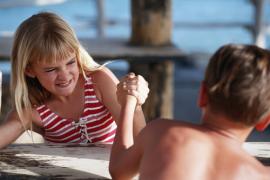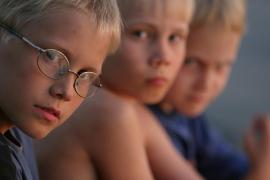As a camp professional, I, like you, have literally thousands of affirming anecdotal stories — the camp experience is not discretionary. And, if anyone needs more evidence, ACA's outcomes research confirms what each of us already knows. Our CEO, Peg Smith*, has been telling the world that opportunities for growth and development exist in natural settings that promote experiential learning, improve social skills and physical fitness, teach children to take calculated risks in a safe environment, and expand the creative mind.
We've known this for more than one hundred years, and ACA's anniversary Web site, www.ACAcamps.org/anniversary/, chronicles the evolution of the camp movement; but today we are at a critical crossroads, because education reform has become a hot topic of conversation among those who think that lengthening the school day and/or the school year can amend academic achievement lags.
This hypothesis clearly is faulty. Peg affirms what we know empirically: "Teaching children to pass standardized tests doesn't necessarily teach them to think for themselves. Education is about more than teaching answers; it's about equipping our kids with the ability to develop the art of seeing possibilities."
Camp is, in fact, the quintessential experiential classroom, and we need to reframe how we articulate its value in the context of the education reform conversation. Camp is an extension of traditional education, a component of learning that addresses a different set of "R's" from Academia's classic "Reading, ‘Riting, and ‘Rithmatic." At camp, children learn about Respect, Responsibility, Resourcefulness, and Resilience. Youth development research is quite clear on this subject — children, regardless of the amount of textbook learning they have acquired, cannot become successful adults without these competencies.
There are three acknowledged and identified components to positive youth development, and we've all seen them in the metamorphosis that occurs at camp. Children need to be productive, to feel connected, and to be able to navigate on their own.
The education reform discussion often focuses on summer learning loss which has been documented among children who do not engage in educational activities during the summer. But camp IS an educational activity, and so it not only enhances a child's social education but also prevents the median loss of two to three months of grade equivalency for those who are not in a learning environment.
Let's be a part of the conversation and advocate for camp as a vital component of education reform. We need to educate Education Secretary Arne Duncan and decision-makers across the country. We have to dispel myths about year-round education taking place only in schools. We must seize every opportunity we can find to inform the discussion.
For starters, we can encourage our camp families to log on to www.CampParents.org and follow the prompts to share their concerns with their local media. There they will find a template letter to the editor, which they can edit to be specific to their family. They can open the advocacy tool and type in their zip code, thereby selecting all the media contacts in their vicinity.
And, each of us should do the same. After all, we are the historians, the observers, the scribes of how camp provides the social education that children need to hold their competitive edge in the world.
As Peg underscores, "Camp is a solution to many of the gaps in our current education system. It teaches values such as self-esteem, teamwork, and caring; areas where traditional schools sometimes cause more detriment than good." In the Great Education Debate, Peg paraphrases Dr. Stephen Fine's 2005 Ph.D. thesis in saying that a camp experience allows everyone, not just the "A" student, to thrive.
I'd like to take that notion one step further. At camp, everyone gets all "A's" — Athletics, Arts, Aquatics, and Adventure — the vehicles through which children learn life skills and hone their abilities to invent themselves. That's where success is measured.
Camp: the experiential classroom. No grades. No permanent records. All "A's." It's the power of fun.
Marla Coleman is a past president of the American Camp Association (ACA) and a founding director of Coleman Country Day Camp in Merrick, New York. She is an ACA media resource and co-author of the handbook for camp directors and other youth-serving professionals, Crisis Communications; and she writes a blog, Campfire Stories for Parents, which can be found at www.MarlaColeman.com and on ACA's parent resource Web site, www.CampParents.org.
Originally published in the 2010 March/April issue of Camping Magazine.
*Peg Smith retired as CEO of the American Camp Association on January 1, 2015


